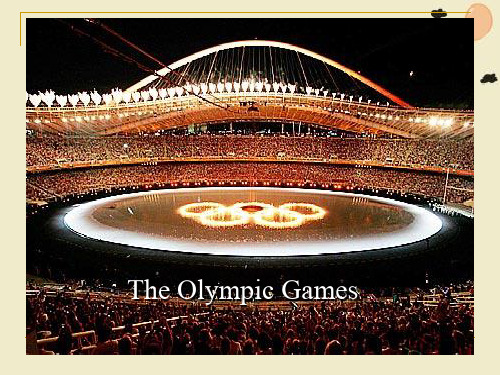高一英语the olympic games
- 格式:pptx
- 大小:124.95 KB
- 文档页数:10

高一英语必修2 Unit 2 The Olympic games (被动语态)【本讲教育信息】一、教学内容:被动语态——The passive voice (1)二、知识精讲(1)语态分类英语动词有两种语态,主动语态和被动语态。
主动语态表示主语是动作的执行者,被动语态表示主语是动作的承受者。
They will build a new bridge over the river. (主动)A new bridge will be built over the river. (被动)(二)被动语态的构成由助动词be + 及物动词的过去分词构成。
而在汉语中常用“被”、“给”、“由”、“受”等词来表示被动。
(三)被动语态常见的几种时态1. 一般现在时:am / is / are +done例:Rice is grown in the south of our country.我国南方种植大米。
We are not allowed to enter the chemistry lab without the teacher’s permission.没有老师的允许我们不允许进入化学实验室。
2. 一般过去时:was / were +done例:His lessons were not easily forgotten.他的课不容易被忘记。
A tall building was put up in my hometown last year.去年(在)我的家乡建了一座高楼。
3. 一般将来时:shall/ will be+ done例:Plenty of jobs will be given to college graduates.将给大学毕业生提供大量的工作。
Hundreds of jobs will be lost if the factory closes.如果工厂倒闭的话,将失去许多工作岗位。
4. 过去将来时:would +be+ done例:The project would be completed by the end of the year.这项工程将于年底完工。

语篇翻译(一)课文注释Unit 2 ReadingThe Olympic GamesGood afternoon, students and teachers. As a member of the International Olympic Committee, I am delighted to①have been invited to your school to talk to you about the history and significance②of the Olympic Games. I'll share some interesting facts and stories with you, and then we'll have time for questions.Do you know when the ancient Olympic Games began? It was in the year 776 BC. They were held at Olympia in Greece every four years③, for almost 12 centuries, until AD 394.Some of the sports from the ancient Olympics are still seen today, such as the long jump, wrestling and running. At the ancient Olympics, by tradition④the athletes were all men and they had to compete wearing no clothes. Single women were allowed to take part in⑤their own competition⑥, at a separate festival in honour of Hera, the wife of the Greek god Zeus. Today, both male and female athletes from around the world can take part, no matter what nation they come from.The contemporary⑦Olympics were first held in 1896, in Athens. It was a Frenchman, Pierre de Coubertin, who brought the Olympics back to life⑧. He dreamt that the Olympics would make it possible for people of all countries to live side by side⑨in peace⑩. Now people all over the world are helping to realize this dream⑪. Among them are many well-known athletes.Did you know that perhaps the most famous boxer of all time first came to public attention⑫during the 1960 Rome Olympics? He won the gold medal for the USA, under his birth name Cassius Clay. Afterwards, this young man went on⑬to win the World Heavyweight Boxing Championship in 1964 and later changed his name to the one we all know, Muhammad Ali. He returned to the Olympic Games in Atlanta in 1996 to light the Olympic flame at the opening ceremony⑭.Another sports star I would like to mention is Michael Jordan. Everyone knows of⑮his success in the NBA, but do you know that he helped the USA basketball team win the gold medal at the 1984 Los Angeles Olympics? Jordan also returned to the Olympics after many years, but unlike Muhammad Ali, he was still competing for⑯ medals. At the 1992 Barcelona Olympics, Jordan won his second Olympic gold medal as a member of the so-called 'Dream Team'.Chinese athletes have also made important contributions⑰ to the Olympic Games. At the 1984 Los Angeles Olympics, the People's Republic of China returned to the Olympics after 32 years' absence⑱. I am sure the whole of China must have felt proud when Xu Haifeng won the first gold medal for his country. Deng Yaping, who won four Olympic gold medals in 1992 and 1996, is perhaps the greatest female table tennis player the world has ever seen. At the 2004 Athens Olympic Games, Liu Xiang excited⑲ people all over Asia when he became the first Asian to win the gold medal in the men's 110-metre hurdles.The Chinese led the way⑳at the 2008 Beijing Olympics, winning 51 gold medals. For the first time in history, the Chinese women's gymnastics team won the gold medal. However, the athlete that some people remember most was Zhang Ning, a former badminton champion. At the age of 33, she was much older than the other players. Yet, she hung on○21to win the gold medal in the final match.These are some of the Olympic athletes who have brought joy to people across the world with their attempts ○22to push○23the boundaries of human achievement. We are looking forward to○24 seeing more of them in future Olympic Games. Join me in wishing the Olympic Movement a successful future to match○25its past glory○26. Thank you. Now, are there any questions?课文注释①be delighted to do/to have done : 高兴去做某事/ 高兴做过某事②significance n. 意义;重要性be of significance =be significant③every four years每四年④by tradition照传统⑤take part in参加,参与⑥competition n. 竞争;比赛,竞赛compete vi. 竞争;比赛;对抗competitive adj. 竞争的;比赛的⑦contemporary n. 同时代的人;同时期的东西adj. 当代的;同时代的;属于同一时期的⑧bring…back to life 使复活⑨side by side并肩;一起;并排⑩in peace和平地;安静,宁静;安祥地⑪realize one’s dream 实现梦想⑫come to public attention引起公众关注⑬go on to do 继续做另一件事go on doing sth 继续做同一件事⑭at the opening ceremony在开幕式上; 在开幕典礼上⑮know of知道,了解…;听说过…⑯compete for为…竞争;为…比赛⑰made contributions to 为…做贡献⑱absence n. 没有;缺乏;缺席;不注意adj. 缺席的;缺少的;心不在焉的;茫然的be absent fromvt. 使缺席absent oneself from⑲excite vt. 激起;刺激…,使…兴奋excited adj. 兴奋的;激动的exciting adj. 令人兴奋的/激动的⑳lead the way 领先;带路○21hang on坚持下去;不挂断;握住不放○22with one’s attempt to do 尝试做某事○23push vt. 推动,增加;对…施加压力,逼迫;按;说服vi. 推进;增加;努力争取n. 推,决心;大规模攻势;矢志的追求○24look forward to (doing) sth 盼望/期待做某事○25match vt. 使比赛;使相配;敌得过,比得上;相配;与…竞争vi. 比赛;匹配;相配,相称;相比n. 比赛,竞赛;匹配;对手;火柴○26glory n. 光荣,荣誉;赞颂课文译文奥林匹克运动会老师们,同学们,下午好。


高一必修一reading知识点Reading是英语学习的重要组成部分,通过阅读我们可以提高词汇量、理解能力和阅读速度。
高一必修一的Reading部分主要包括课文内容和相关知识点。
下面将按照学习的顺序,简要介绍高一必修一Reading的知识点。
第一单元:The world in the future(未来的世界)本单元主要讲述未来的世界,包括科技、气候变化和环境等方面。
在阅读中,我们需要关注相关词汇,如technology(技术)、global warming(全球变暖)和pollution(污染)等。
同时,还需要学习一些重要的语法结构和句型,如条件句和固定短语。
第二单元:The Olympic Games(奥运会)本单元介绍了奥林匹克运动会的起源、发展和特点。
在阅读中,我们需要了解一些关于奥运会的常用词汇,如medal(奖牌)、athlete(运动员)和venue(场馆)等。
此外,还需要掌握一些表示时间、顺序和比较的词语和句型。
第三单元:English around the world(世界英语)本单元主要探讨了英语在世界各地的使用情况和变化。
在阅读中,我们需要了解有关英语的语言特点、使用范围和影响等内容。
词汇方面,我们需要注意一些描述语言变化和多样性的词汇,如dialect(方言)、accent(口音)和bilingual(双语的)等。
第四单元:Music(音乐)本单元介绍了音乐的不同类型、艺术家和音乐家等内容。
在阅读中,我们需要理解音乐方面的相关词汇,如genre(类型)、composer(作曲家)和instrument(乐器)等。
除此之外,还需要注意一些词汇和短语的用法和搭配。
第五单元:Health(健康)本单元围绕健康生活方式和相关的问题展开阐述。
在阅读中,我们需要理解与健康有关的词汇和短语,如exercise(锻炼)、balanced diet(均衡饮食)和stress(压力)等。
另外,还需要掌握一些表示原因和结果的语法结构。

Unit 2 The Olympic Games学科:English 授课班级:Senior One 执教教师:授课时间:旁注I.教学内容分析本单元的中心话题是“奥运会”。
Warming Up部分通过讨论让学生了解古代和现代奥运会的异同。
Pre-reading部分的三个问题则进一步考查学生对奥运会基本常识的了解。
Reading部分作者通过一个虚拟的采访向读者介绍了古代奥运会与现代奥运会的异同。
Comprehending部分帮助学生归纳他们已知的和刚学到的关于古代与现代奥运会异同,并且进一步讨论奥运会相关知识。
Learning about Language部分都同单元主题紧密相关,词汇和语法结构的呈现也尽可能地安排在相关的语境中。
Using Language部分通过一个希腊神话故事来引导学生进行读、听、说、写的综合训练。
Learning Tip部分鼓励学生在两人活动和小组活动中积极发言,这样既可以消除害羞的心理,又有利于学生掌握恰当的交际策略。
II.教学重点和难点1.教学重点(1) 本单元的生词和短语;(2)学会使用将来时的被动语态;(3)让学生熟悉奥运会—世界上最重要的体育盛会;能用英语就奥运会的基本知识进行互相问答,并能简述奥运会的基本知识;(4)鼓励学生表达自己的兴趣爱好,要多让学生讲自己熟悉的话题。
2.教学难点(1) 指导学生按类别归纳整理词汇,让学生学会有效的记忆词汇的方法;(2) 引导学生发现本单元重点语言结构,让学生自己发现并感悟相关的语言规律,培养他们的语感。
III.教学计划本单元分五课时:第一、二课时:Warming up,Pre-reading, Reading, Comprehension第三课时:Learning about Language第四课时:Reading, Writing (Using Language)第五课时:Listening, Speaking, Writing (Using Language)第六、七课时:Vocabulary and Useful ExpressionsIV.教学步骤:Period 1&2 Warming Up, Pre-reading, ReadingTeaching Goals:1.To arouse Ss’ interest in learning about the history of the Olympics.2.To read an interview about the Olympics.Teaching Procedures:Step 1. Leading-inPurpose: To activate Ss and arouse them to talk about mascots in the Olympic Games.。
